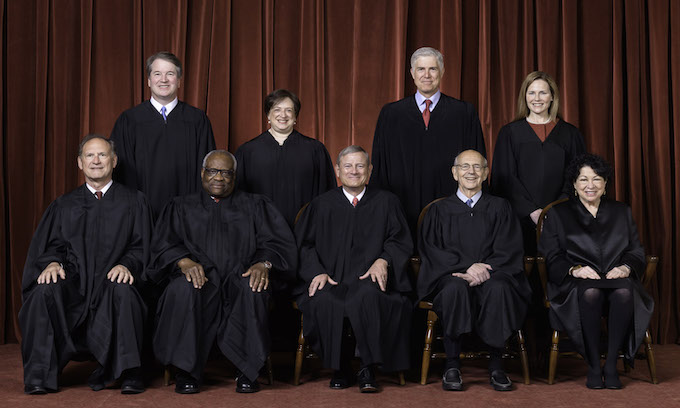The U.S. Supreme Court will hear arguments Wednesday in a key abortion case that seeks to challenge the landmark 1973 ruling Roe vs. Wade, which made the practice legal in the United States.
At the center of the legal challenge is a Mississippi law that bars abortions after 15 weeks. The high court will decide whether to uphold the law and overturn Roe vs. Wade.
Some experts say the Mississippi law is the most significant challenge to Roe vs. Wade in recent memory. And because the court has a 6-3 conservative majority, some think the landmark law may be in serious jeopardy.
The court includes three appointees of former President Donald Trump — Neil Gorsuch, Brett Kavanaugh and Amy Coney Barrett.
The arguments in the case, Dobbs vs. Jackson Women’s Health Organization, are expected to start at 10 a.m. EST and audio of the arguments will be streamed live.
A decision by the Supreme Court in 1992 began to erode Roe vs. Wade by allowing states to regulate abortion rights as long as they didn’t impose an undue burden on women before fetal viability at 23 to 24 weeks. Since then, states have pushed the “undue burden” line.
“The very essence of a constitutional right is that it is not up to the legislatures,” Julie Rikelman, senior director of litigation at the Center for Reproductive Rights, told NPR. “It’s a right that we all have [that] the legislators cannot take away from us.”
In a speech on Tuesday to advocacy groups Advancing American Freedom and the anti-abortion group Susan B. Anthony List, former Vice President Mike Pence said he believes the arguments should send Roe vs. Wade to “the ash heap of history.”
“Now more than ever, we need our conservative majority on the Supreme Court of the United States to return the question of life to the states and the people,” Pence said, according to CNN. “While I cannot say how the Supreme Court will rule, today I can say with confidence the tide has turned for the pro-life movement.”
While the high court has taken on the Mississippi case, it has not yet ruled on the more stringent abortion law in Texas, which bars the practice as soon as a fetal heartbeat is detected, which can be as soon as six weeks and before a woman even knows she is pregnant. The law allows private citizens to file lawsuits in an effort to get around legal challenges.
Copyright 2021 United Press International, Inc. (UPI). Any reproduction, republication, redistribution and/or modification of any UPI content is expressly prohibited without UPI’s prior written consent.
—-
This content is published through a licensing agreement with Acquire Media using its NewsEdge technology.



















Ever since Roe v Wade was not voted in, but thrust upon the good people of American innocence by a few political motivated Supremes, the blessings of God on America have diminished as we began to reflect the image not of our creator but of the great Consumer who like WE THE PEOPLE, rebelled against heaven itself. We have increased in wealth but also in moral challenges, social divisions, and physical attacks from without. Not a coincidence but a self-chosen act. We can resolve this as easily as we can resolve our energy shortage with the stoke of a pipeline pen, namely allow the protection and teachings of God back into our schools, at least on equal footing with the now Court approved religion of secular socialism. The Great American self-created Consumers have barred the door Providence himself, and in doing so, turned our schools into shooting galleries of children lined up like ducks in a row, whose innocence is stolen in misguided sex education and government entitlements that encourage stealing in the form of government taxation, and murder in the form of aborted American life force infants that matures to murder in our schools and streets as the immoral teachings taught by the seculars comes of age. We must kill Roe v Wade, that which has killed more American innocence than the sum total of all American wars and paved the way to our current American socially created hell, created of course with their so-called secular socialist good intentions.
I am a proud agnostic, and like myself, i know MANY OTHERS who also feel abortion is wrong..